Impeachment may have leapfrogged to the top of the national agenda, but members of Congress still have their day jobs as legislators, and they're returning to Washington this coming week with mixed hopes of success.
It's a volatile, difficult-to-predict time in Washington as lawmakers end a two-week break. The notion that President Donald Trump could do much significant dealmaking with House Speaker Nancy Pelosi, his impeachment antagonist, could be fanciful, given Trump's impulsiveness and demands for border wall money.
An important trade agreement pact has a pulse. An effort to deal with high prescription drug prices seems stuck.
Pelosi, D-Calif., is aware of the political imperative to avoid looking tied up in impeachment while leaving the rest of the nation's business hanging. At a recent news conference she solicited questions on topics such as trade before turning to impeachment, reminding that the Democratic-controlled House has sent bill after bill to the GOP-led Senate, which has done little else but vote on presidential nominations for months.
Divided government has produced scant results thus far, except for a small-scale budget deal that lawmakers are struggling to put in place. The next few months could prove make or break for high-profile agenda items such as an updated trade agreement with Canada and Mexico, a full slate of spending bills and prescription drug legislation. Pelosi insists impeachment doesn't have to harm the legislative agenda in Washington.
"They have nothing to do with each other," Pelosi said earlier this month. "We have a responsibility to uphold our oath of office, to support and defend the Constitution of the United States. We also have a responsibility to get the job done for the American people."
The atmosphere isn't exactly brimming with optimism. Hopes for a near-term breakthrough on trade, one of the few items on which Pelosi and Republicans are in general alignment, faded after AFL-CIO President Richard Trumka issued a combative warning against a speedy vote on the new North American pact.
On spending, negotiators are trying push through a $1.4 trillion package of agency spending bills to fill in the details of this summer's budget-and-debt accord.
Experienced bargainers such as GOP Sen. Richard Shelby of Alabama, chairman of the Senate Appropriations Committee, are taking the lead on that but lingering bitterness over the U.S.-Mexico wall fight threatens to again delay a resolution. That's particularly so after Trump's attacked lawmakers' traditional power of the purse by raiding military construction projects to finance wall construction.
Given the uncertainty, lawmakers may end up doing what they do best: Kicking the can down the road.
Months-late enactment of the annual agency appropriations bills is increasingly common in Washington, and it's clear that another temporary government-wide funding bill will be needed when the current one expires in six weeks. Likewise, there's no hard and fast deadline for ratifying an important trade pact with Mexico and Canada that an administration priority.
Pelosi supported the original North American Free Trade Agreement in 1994, as did the current House Ways and Means Committee chairman, Rep. Richard Neal, who has forged a good relationship with U.S. Trade Representative Robert Lighthizer. Pelosi and Neal, D-Mass., had been making cautious but optimistic assurances about the long-delayed trade pact, which is being held up in large part over Mexico's efforts to toughen labor standards and limit U.S. job losses.
A green light from labor would make Pelosi's job much easier, so the outlook for the trade agreement soured considerably when Trumka warned that labor would work to kill it if House Democrats tried to rush a vote.
"If there was a vote before Thanksgiving, the agreement would be defeated," Trumka told The Washington Post.
Steve Elmendorf, a lobbying who cultivates close ties to Democratic leaders, said that before Trumka's remarks, there seemed to be a sense of progress and that lawmakers would have liked to hold a vote before the holiday. He said that if Pelosi "can get a good deal, she is completely capable of compartmentalizing this and a bunch of other issues in a different lane than impeachment."
What does need to pass before Thanksgiving is another short-term measure to prevent a government shutdown. That would buy more time for lawmakers to try to negotiate a full package of spending bills.
Pelosi and Senate Majority Leader Mitch McConnell, R-Ky., have a proven track record as negotiators who can deliver. But Trump could upend the situation at any time. He's at least given negotiators the green light to try to find a way to an agreement.
The glass half-full take is that both Trump and Pelosi need legislative victories heading into next year's elections. Pelosi has a slew of freshmen Democrats from swing districts with lots of middle-of-the-road voters, while Trump hasn't delivered on many bread-and-butter issues since his 2017 tax cut bill.
Talks on prescription drugs face considerable obstacles, however. McConnell has promised to stop Pelosi's bill is its tracks, but a bipartisan Senate bill has divided Republicans and faces big hurdles of its own.
There's another factor that tilts the playing field toward delay: There is plenty of time. Unlike the burst of legislating that occurred on the cusp of President Bill Clinton's impeachment in the fall of 1998, Congress can still wrap up its work next year.
UNITED NATIONS (AP) — The United States vetoed a widely backed U.N. resolution Thursday that would have paved the way for full United Nations membership for Palestine, a goal the Palestinians have long sought and Israel has worked to prevent.
The vote in the 15-member Security Council was 12 in favor, the United States opposed and two abstentions, from the United Kingdom and Switzerland. U.S. allies France, Japan and South Korea supported the resolution.
The strong support the Palestinians received reflects not only the growing number of countries recognizing their statehood but almost certainly the global support for Palestinians facing a humanitarian crisis caused by the war in Gaza, now in its seventh month.
The resolution would have recommended that the 193-member U.N. General Assembly, where there are no vetoes, approve Palestine becoming the 194th member of the United Nations. Some 140 countries have already recognized Palestine, so its admission would have been approved, likely by a much higher number of countries.
U.S. deputy ambassador Robert Wood told the Security Council that the veto “does not reflect opposition to Palestinian statehood but instead is an acknowledgment that it will only come from direct negotiations between the parties."
The United States has “been very clear consistently that premature actions in New York — even with the best intentions — will not achieve statehood for the Palestinian people,” deputy State Department spokesman Vedant Patel said.
His voice breaking at times, Palestinian U.N. Ambassador Riyad Mansour told the council after the vote: “The fact that this resolution did not pass will not break our will and it will not defeat our determination.”
“We will not stop in our effort,” he said. “The state of Palestine is inevitable. It is real. Perhaps they see it as far away, but we see it as near.”
This is the second Palestinian attempt for full membership and comes as the war in Gaza has put the more than 75-year-old Israeli-Palestinian conflict at center stage.
Palestinian President Mahmoud Abbas first delivered the Palestinian Authority’s application for U.N. membership in 2011. It failed because the Palestinians didn’t get the required minimum support of nine of the Security Council’s 15 members.
They went to the General Assembly and succeeded by more than a two-thirds majority in having their status raised from a U.N. observer to a non-member observer state in 2012. That opened the door for the Palestinian territories to join U.N. and other international organizations, including the International Criminal Court.
Algerian U.N. Ambassador Amar Bendjama, the Arab representative on the council who introduced the resolution, called Palestine’s admission “a critical step toward rectifying a longstanding injustice" and said that “peace will come from Palestine’s inclusion, not from its exclusion.”
In explaining the U.S. veto, Wood said there are “unresolved questions” on whether Palestine meets the criteria to be considered a state. He pointed to Hamas still exerting power and influence in the Gaza Strip, which is a key part of the state envisioned by the Palestinians.
Wood stressed that the U.S. commitment to a two-state solution, where Israel and Palestine live side-by-side in peace, is the only path for security for both sides and for Israel to establish relations with all its Arab neighbors, including Saudi Arabia.
“The United States is committed to intensifying its engagement with the Palestinians and the rest of the region, not only to address the current crisis in Gaza, but to advance a political settlement that will create a path to Palestinian statehood and membership in the United Nations,” he said.
Mansour, the Palestinian U.N. ambassador, reiterated the commitment to a two-state solution but asserted that Israel believes Palestine "is a permanent strategic threat."
"Israel will do its best to block the sovereignty of a Palestinian state and to make sure that the Palestinian people are exiled away from their homeland or remain under its occupation forever,” he said.
He demanded of the council and diplomats crowded in the chamber: “What will the international community do? What will you do?”
Israeli-Palestinian negotiations have been stalled for years, and Israel’s right-wing government is dominated by hard-liners who oppose Palestinian statehood.
Israeli U.N. Ambassador Gilad Erdan called the resolution “disconnected to the reality on the ground” and warned that it “will cause only destruction for years to come and harm any chance for future dialogue.”
Six months after the Oct. 7 attack by the Hamas militant group, which controlled Gaza, and the killing of 1,200 people in “the most brutal massacre of Jews since the Holocaust,” he accused the Security Council of seeking “to reward the perpetrators of these atrocities with statehood.”
Israel’s military offensive in response has killed over 32,000 Palestinians, according to Gaza’s health ministry, and destroyed much of the territory, which speaker after speaker denounced Thursday.
After the vote, Erdan thanked the United States and particularly President Joe Biden “for standing up for truth and morality in the face of hypocrisy and politics.”
He called the Palestinian Authority — which controls the West Bank and the U.S. wants to see take over Gaza where Hamas still has sway — “a terror supporting entity.”
The Israeli U.N. ambassador referred to the requirements for U.N. membership – accepting the obligations in the U.N. Charter and being a “peace-loving” state.
“How can you say seriously that the Palestinians are peace loving? How?” Erdan asked. “The Palestinians are paying terrorists, paying them to slaughter us. None of their leaders condemns terrorism, nor the Oct. 7 massacre. They call Hamas their brothers.”
Despite the Palestinian failure to meet the criteria for U.N. membership, Erdan said most council members supported it.
“It’s very sad because your vote will only embolden Palestinian rejectionism every more and make peace almost impossible,” he said.
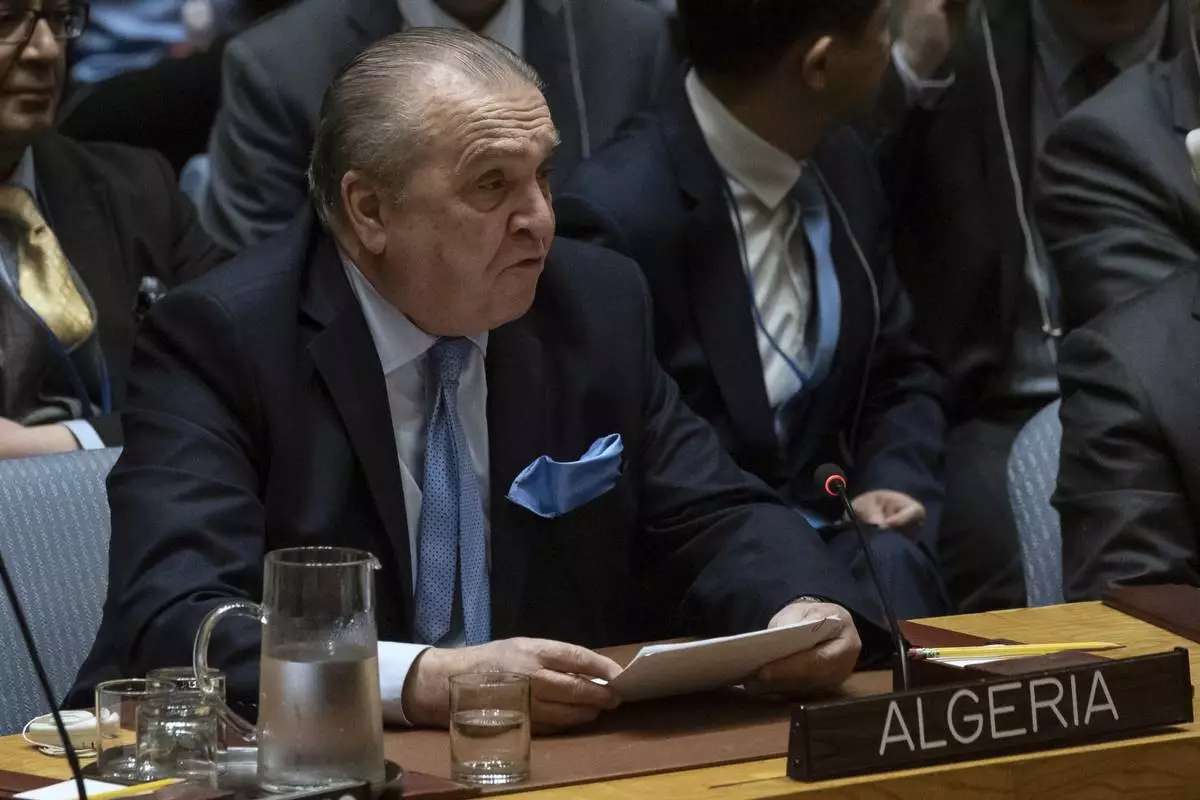
Algeria's Permanent Ambassador to the United Nations Amar Bendjama speaks during a Security Council meeting at United Nations headquarters, Thursday, April 18, 2024. (AP Photo/Yuki Iwamura)
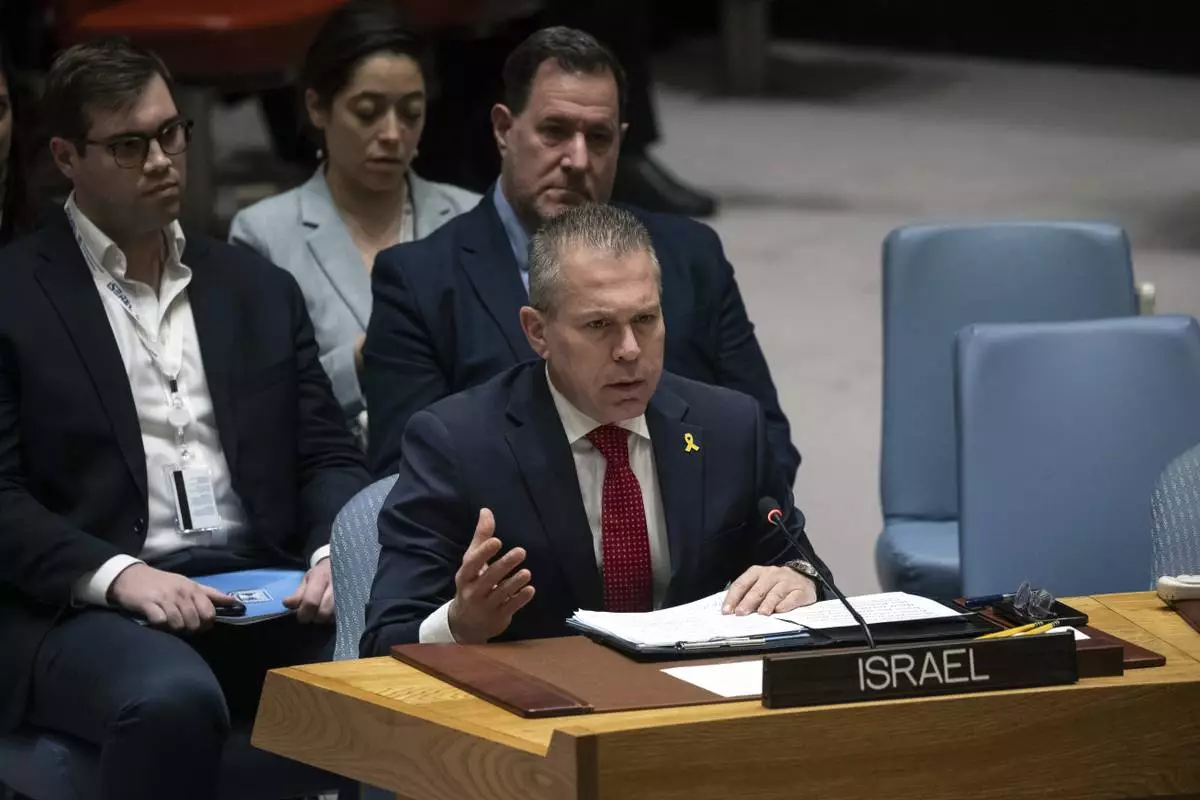
Israeli Ambassador to the United Nations Gilad Erdan speaks during a Security Council meeting at United Nations headquarters, Thursday, April 18, 2024. (AP Photo/Yuki Iwamura)
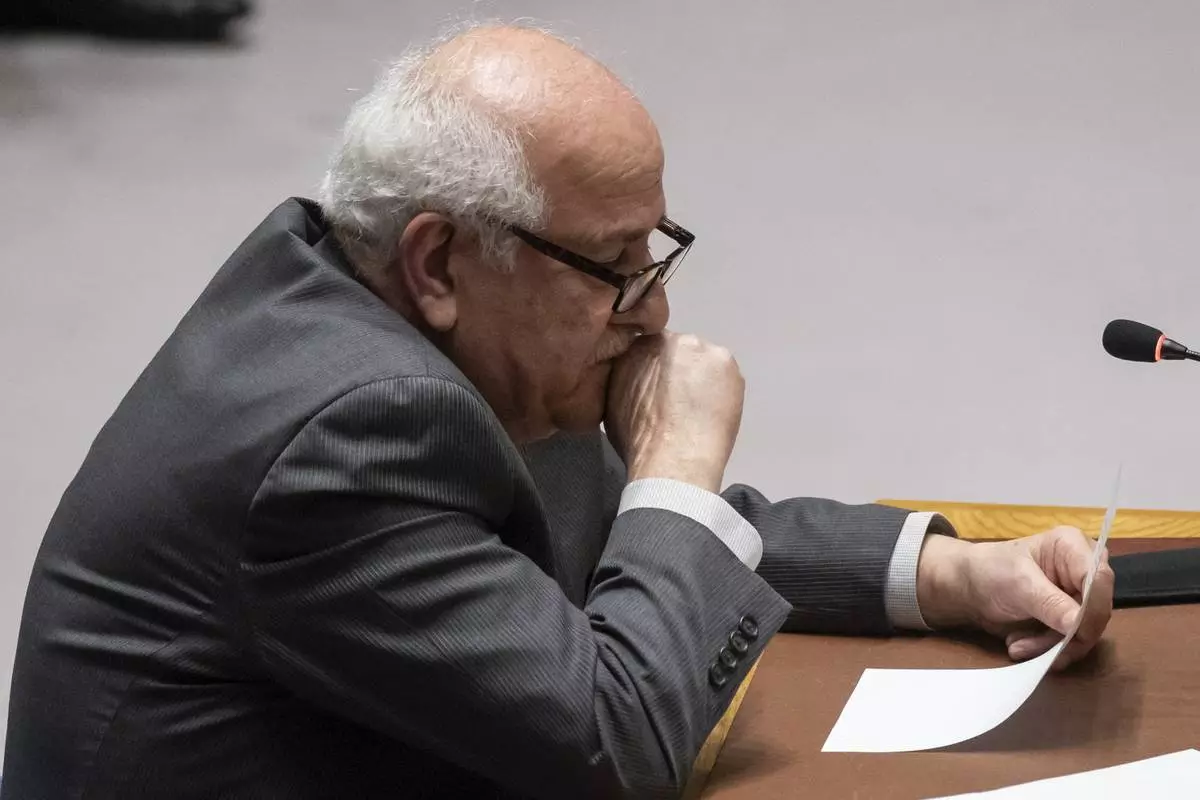
Palestinian Ambassador to the United Nations Riyad Mansour holds tears while speaking during a Security Council meeting at United Nations headquarters, Thursday, April 18, 2024. (AP Photo/Yuki Iwamura)
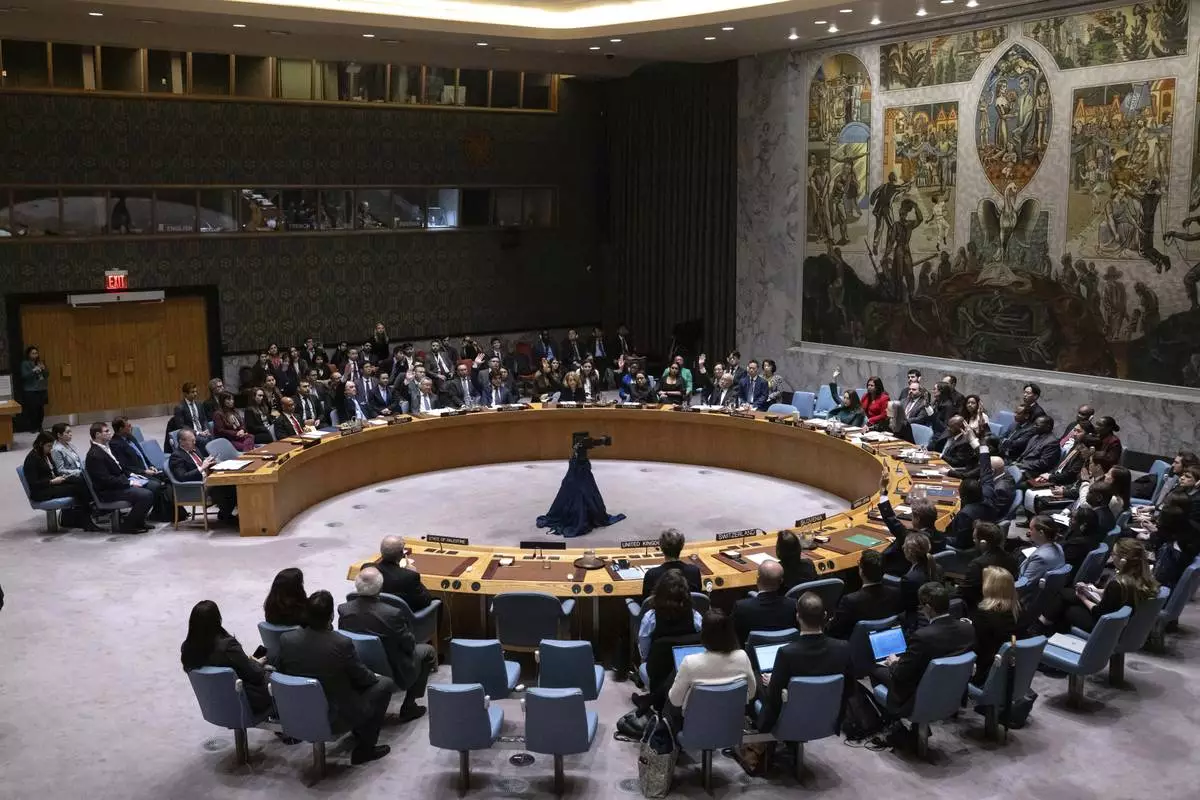
Representatives of member countries take votes during a Security Council meeting at United Nations headquarters, Thursday, April 18, 2024. (AP Photo/Yuki Iwamura)
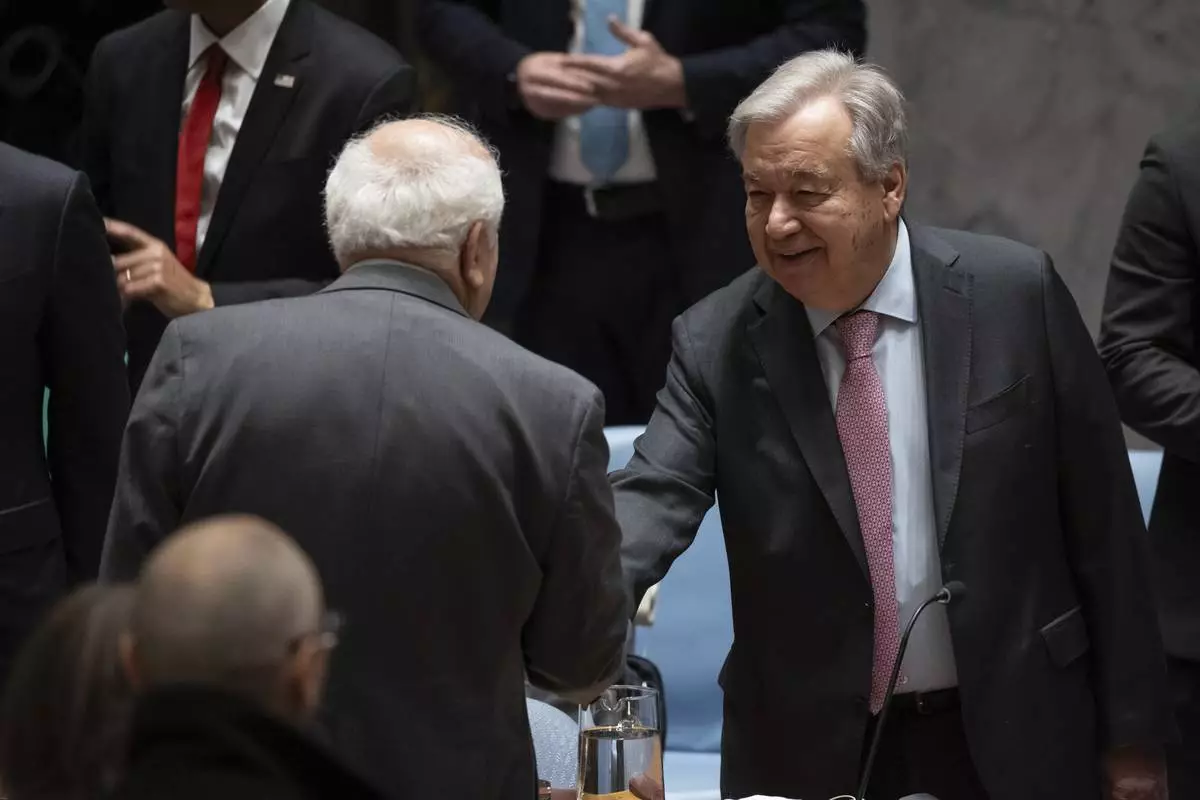
Palestinian Ambassador to the United Nations Riyad Mansour, left, and United Nations Secretary-General Antonio Guterres speak before a Security Council meeting at the United Nations headquarters, Thursday, April 18, 2024. (AP Photo/Yuki Iwamura)
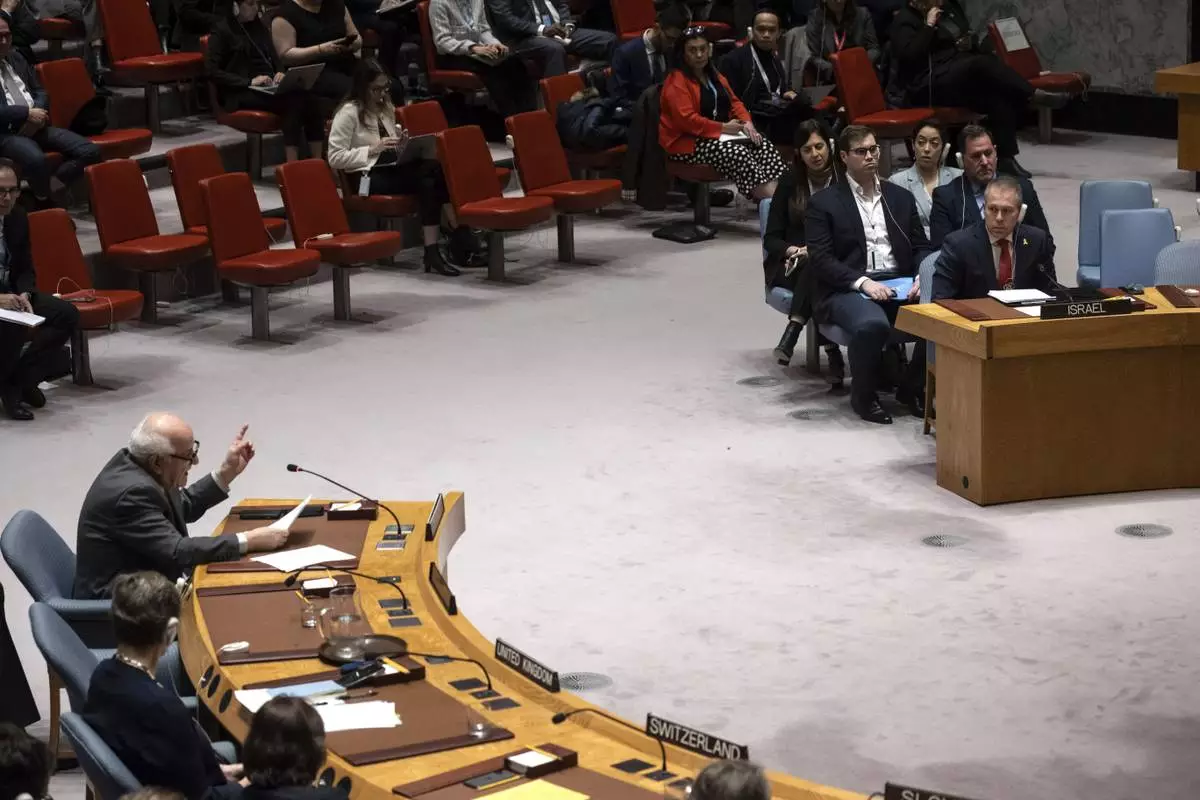
Palestinian Ambassador to the United Nations Riyad Mansour speaks during a Security Council meeting at United Nations headquarters, Thursday, April 18, 2024. (AP Photo/Yuki Iwamura)
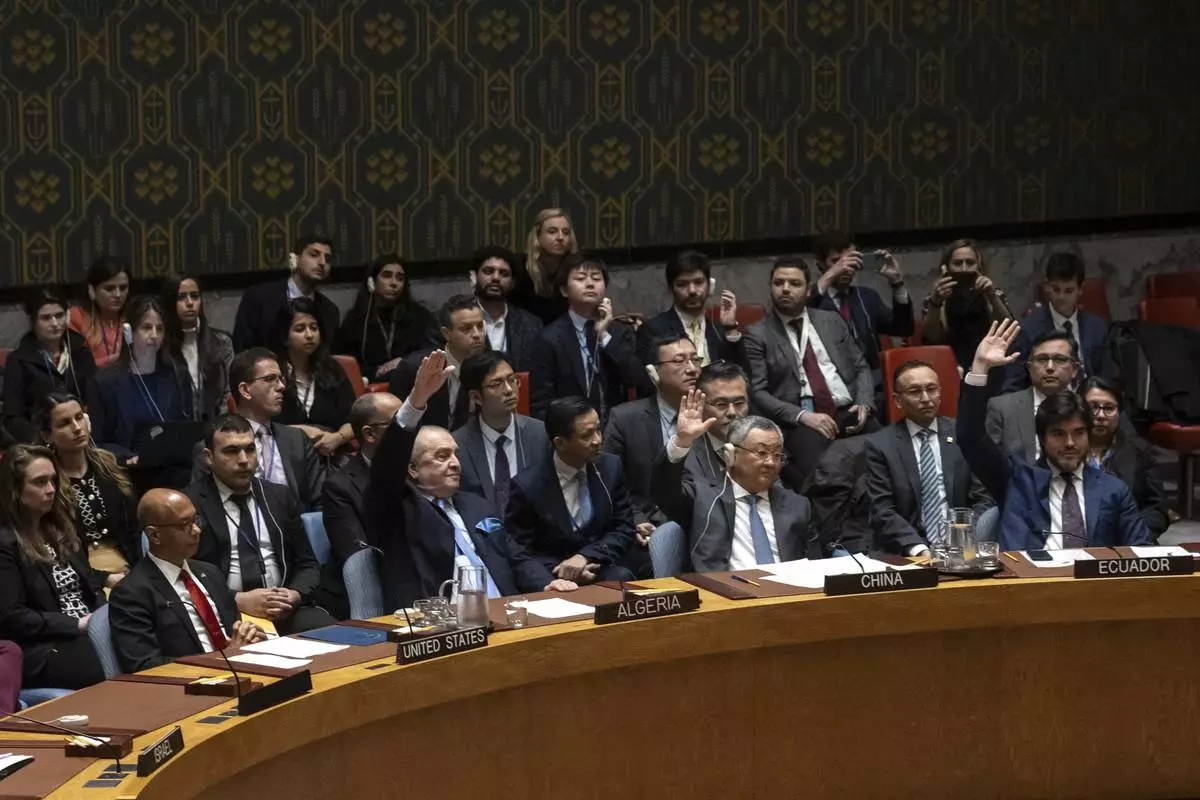
Representatives of member countries take votes during a Security Council meeting at United Nations headquarters, Thursday, April 18, 2024. (AP Photo/Yuki Iwamura)
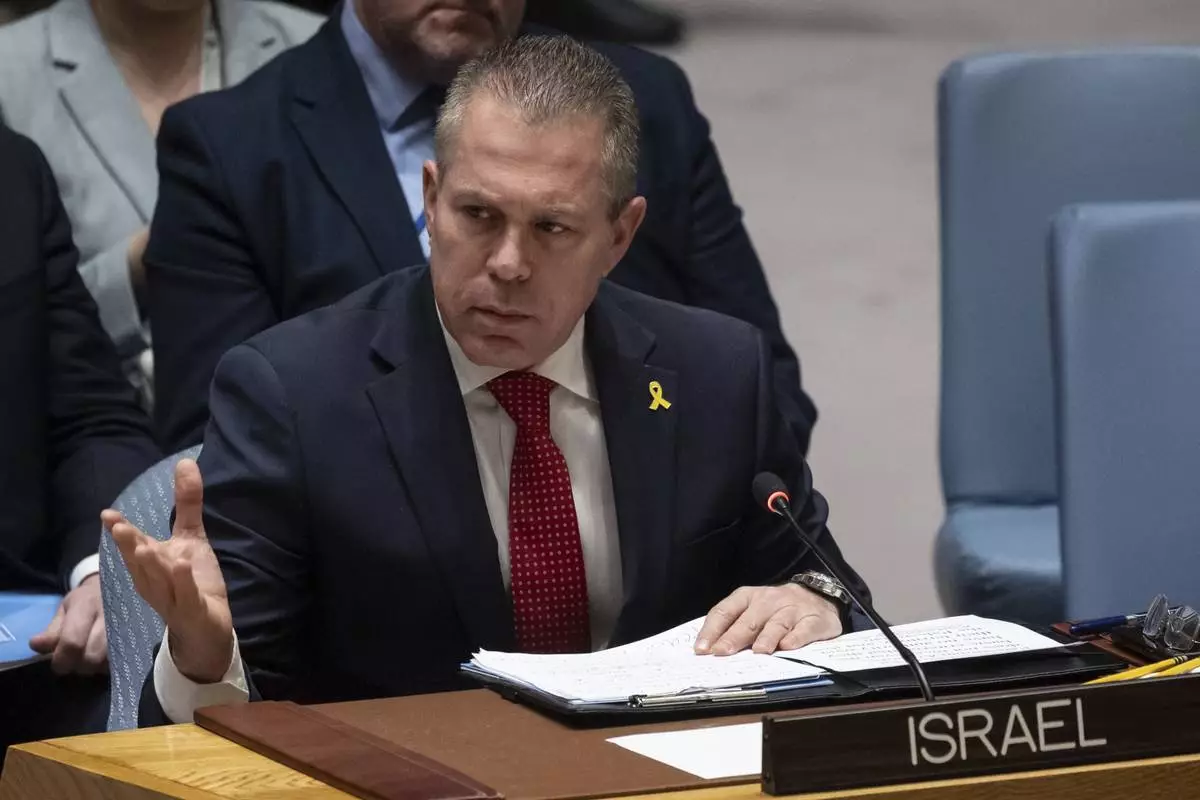
Israeli Ambassador to the United Nations Gilad Erdan speaks during a Security Council meeting at United Nations headquarters, Thursday, April 18, 2024. (AP Photo/Yuki Iwamura)
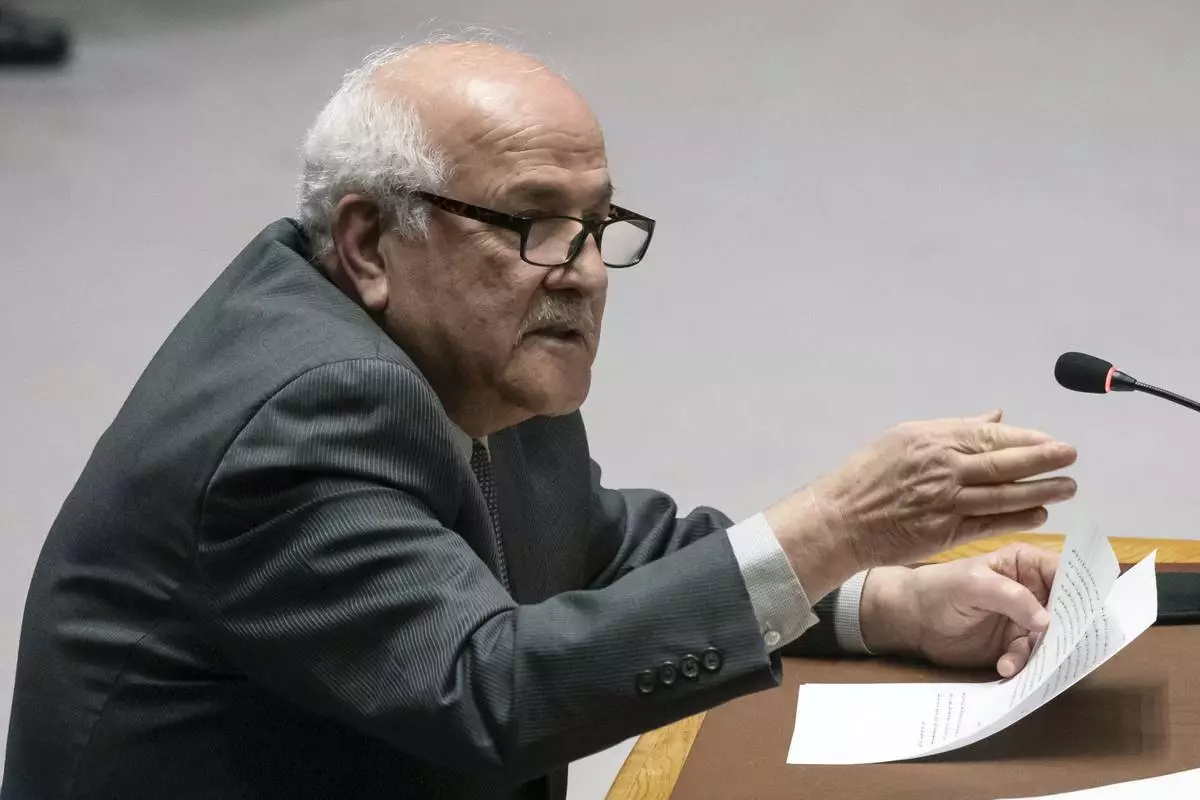
Palestinian Ambassador to the United Nations Riyad Mansour speaks during a Security Council meeting at United Nations headquarters, Thursday, April 18, 2024. (AP Photo/Yuki Iwamura)
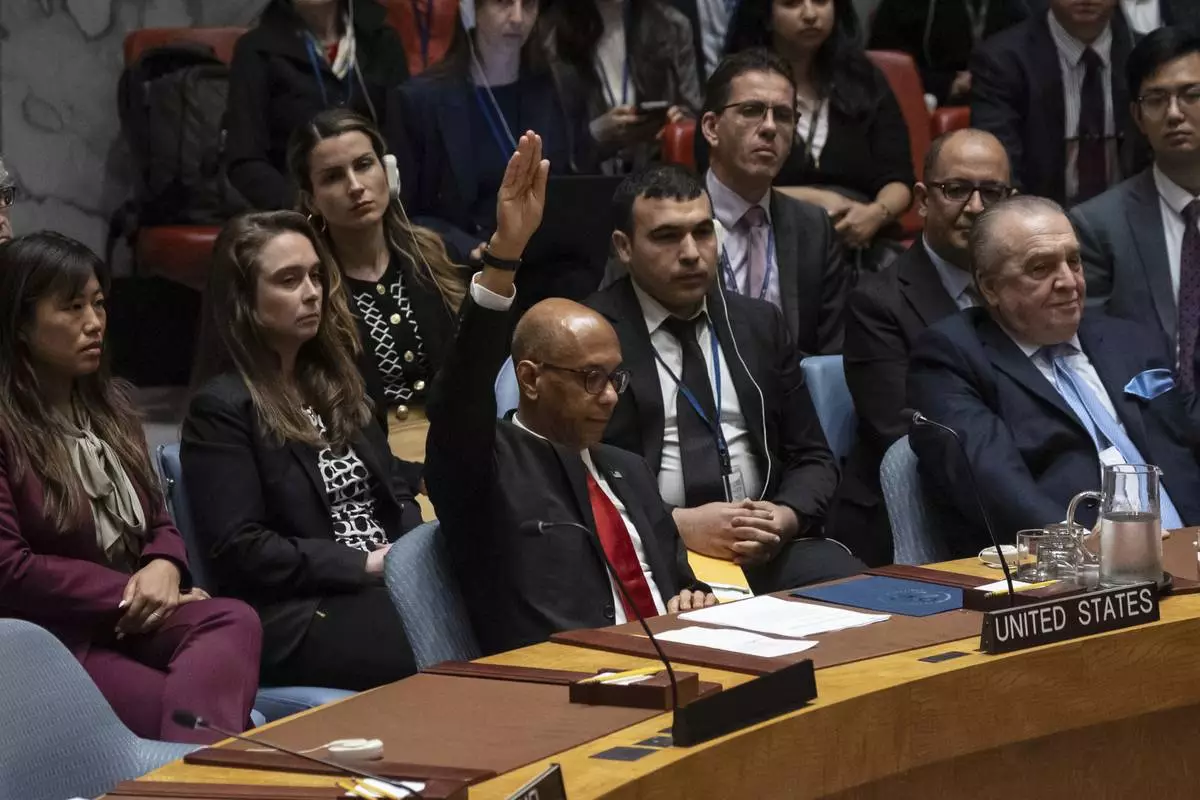
U.S. Deputy Ambassador Robert Wood votes against resolution during a Security Council meeting at United Nations headquarters, Thursday, April 18, 2024. (AP Photo/Yuki Iwamura)



















